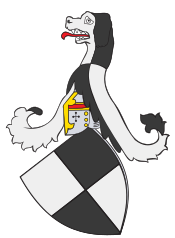Hohenzollerns
| House of Hohenzollern | |
|---|---|
 |
|
| Country | Germany, Romania |
| Titles |
German Emperor Count of Zollern Margrave of Brandenburg Duke of Prussia Burgrave of Nuremberg Margrave of Bayreuth Margrave of Brandenburg-Ansbach King of Prussia Prince of Neuchâtel King of Romania Prince of Hohenzollern-Hechingen Prince of Hohenzollern-Sigmaringen |
| Founded | 11th century |
| Founder | Burkhard I, Count of Zollern |
| Final ruler |
Germany and Prussia: Emperor Wilhelm II (1888–1918) Romania: King Michael I (1927–1930, 1940–1947) |
| Current head |
Germany and Prussia: HI&RH Prince Georg Friedrich (1994–present) Hohenzollern-Sigmaringen: HSH Prince Karl Friedrich (2010–present) Romania: HRH Princess Margareta (2017–present) |
| Deposition |
Germany and Prussia: 1918: German Revolution Romania: 1947: Stalinist take-over |
| Ethnicity | German |
| Cadet branches |
Prussia Romania |
The House of Hohenzollern [ˈhoːənˌʦɔlɐn] is a dynasty of former princes, electors, kings and emperors of Hohenzollern, Brandenburg, Prussia, the German Empire, and Romania. The family arose in the area around the town of Hechingen in Swabia during the 11th century and took their name from Hohenzollern Castle. The first ancestor of the Hohenzollerns was mentioned in 1061.
The Hohenzollern family split into two branches, the Catholic Swabian branch and the Protestant Franconian branch, which later became the Brandenburg-Prussian branch. The Swabian branch ruled the principalities of Hohenzollern-Hechingen and Hohenzollern-Sigmaringen until 1849, and also ruled Romania from 1866 to 1947. Members of the Franconian branch became Margrave of Brandenburg in 1415 and Duke of Prussia in 1525.
The Margraviate of Brandenburg and the Duchy of Prussia were ruled in personal union after 1618 and were called Brandenburg-Prussia. The Kingdom of Prussia was created in 1701, eventually leading to the unification of Germany and the creation of the German Empire in 1871, with the Hohenzollerns as hereditary German Emperors and Kings of Prussia.
...
Wikipedia
